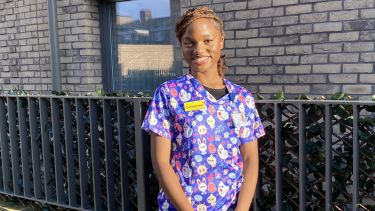My MSc has led me to become a better clinician

What made you decide to study Acquired Communication Disorders at the University of Sheffield?
“When I completed my BSc in Speech and Language Therapy in Uganda, I worked in a really dynamic setting. I would see adults with aphasia, apraxia, dysarthria, and dementia, all in one day, in the same clinical setting. As much as this was very interesting, in a period of three years, I had more questions about each of these conditions and was challenged by the dynamics surrounding each of them, the available treatments, and ongoing research.
“I found working in such a setting rewarding but also challenging, especially when striking the balance between treatment approaches and the knowledge base in ongoing research. I made a decision to do an MSc, to boost my knowledge, understanding, and flexibility between clinical practice and research. In my search for the perfect MSc that fit my interests, I found the Acquired Communication Disorders course at the University of Sheffield.
“There was no other program that suited my needs more than the MSc in Acquired Communication Disorders. The course took a comprehensive approach, where I had options of assignments to choose from, which I found very helpful for my specific research and study interests. In addition to these assignments, modules such as ‘Developing an Evidence Base for Practice’ really led me to become a better clinician who can utilise both clinical experience and research knowledge.”
What knowledge and skills have you developed during your course? How has it developed your working practice?
“There is vast knowledge about acquired communication disorders and important approaches to treatment that I was not previously aware of. The professors are so good at this research and each one of them introduced to us research they had either conducted themselves or had found relevant to each specific communication disorder.
“I was fascinated by the amount and value of the work my professor for Acquired Language and Speech Disorders had accomplished. Having access to such knowledge has been a game changer for my professional journey so far. Not only did I acquire more knowledge - such as studies into the functional treatment approaches to aphasia and research in conversational analysis approaches to dysarthria - but I am also more confident in clinical practice.
I can see a big difference in how I approach complex cases in clinical practice when dealing with progressive neurological conditions.
Catherine Nakawunde
“Overall, I have learnt to ask questions during my clinical practice, find the available answers, and identify gaps in my knowledge that I would like to fill either in the near future or when I eventually participate in speech and language research.”
Tell us about where you're working now?
“After my MSc in Acquired Communication Disorders, I started working in my first-ever acute medical speech and language therapy position in the NHS. The position focuses on dysphagia screening, assessment, management, and education. On the caseload, we are also involved in supporting communication through different therapies and Augmentative and Alternative Communication (AACs).
“Graduating with my masters meant I could confidently approach a specialised clinical role like this one, compared to my previous roles. I had more advanced knowledge yet I was more open to learning and asking relevant questions of my co-workers and line manager. I was confident and I have so much gratitude for my MSc choice.”
What would you say to a student thinking about studying their course at the University of Sheffield?
“The department of Human Communication Sciences has the most passionate professors in this subject area. Professor Ray Wilkinson challenged me to look at aphasia in all aspects, not just the impairment-based ones. I recall how he repeatedly emphasised ‘what if we looked at supporting our patients in a different approach, rather than trying so hard to fix them?’ He also opened my mind up to other approaches to dysarthria, which has now completely improved the way I support my patients.
“My research supervisor was also very supportive and more available than one would expect. She always shared feedback and created time when I reached out. I found the regularly scheduled meetings helpful to help me carry through my research project. Even when I was stuck, I knew when I had my check-in with her, my research would take another good turn.
“I highly recommend this course to any prospective student. You will benefit from this program in all aspects, gaining knowledge in specific topics, research, and overall skills that any clinician or future researcher may need.”

International postgraduate taught scholarships
We offer a generous package of financial support for international postgraduate taught students, including scholarships worth £10,000 towards the original tuition fee.
Applications are open for existing offer holders for a postgraduate taught programme starting in September 2025.

